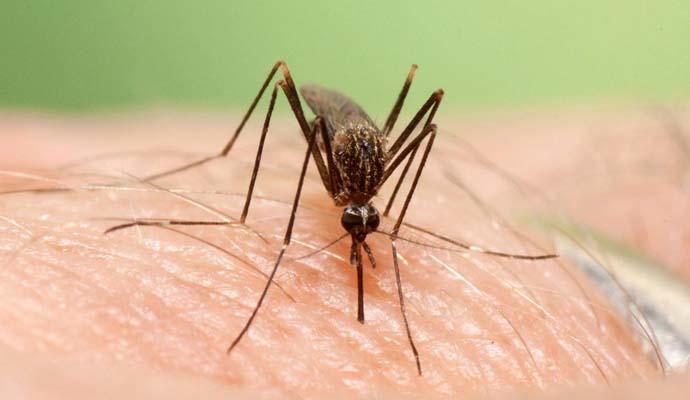15 plants that drive mosquitoes from the garden
Even the most sincere warm evening in the country can be spoiled by annoying mosquitoes – the constant companions of summer suburban life. The chemical industry has come up with hundreds of mosquito repellent drugs. In one way or another, they are all effective, but have significant drawbacks – they are toxic to varying degrees, cause allergies, and in most cases are contraindicated in small children.
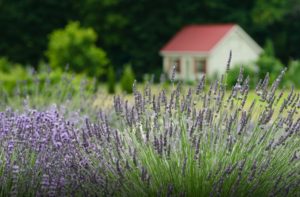
However, nature itself, having created mosquitoes (they are an important part of the food chain), made sure that they did not interfere with our lives. To do this, in her arsenal there are many plants that repel insects with their smell. In this publication we will talk about the 15 most effective plants – “mosquito repellents”, which can be successfully grown even in the middle band.
1. Ageratum
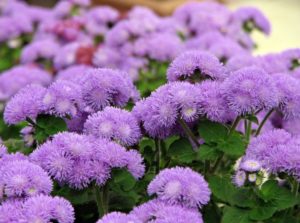
Ageratum
A lot of commercial mosquito repellents use coumarin, a substance that secrets the annual plant Ageratum. Delicate decorative bushes of small sizes will decorate your flower beds (today varieties not only with blue, but also with pink, white and lilac flowers have already been bred) and will become reliable protection against annoying insects. However, do not rub the skin with leaves and flowers of the ageratum. It may cause an allergy. Just plant a flower (or better – not one) in the sun or in partial shade. Ageratum is not a finicky plant, it is also content with poor soils.
2. Lavender narrow-leaved
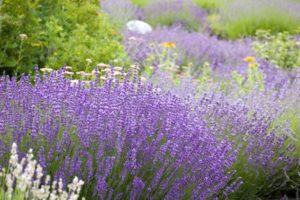
Lavender.
A very beautiful perennial plant with needle-like leaves and delicate white, pink, blue or purple flowers. The narrow-leaved lavender winters well in the midland, is unpretentious in care, grows on poor soils and does not require watering. Lavender bushes are ideal in group plantings, it can also be grown in containers. A person can feel the pleasant smell of this plant only by touching it or cutting branches. But mosquitoes are more sensitive to its aroma and consider it disgusting for themselves. It is noticed that mosquitoes do not fly in the immediate vicinity of lavender plantations (meter and a half).
3. Peppermint
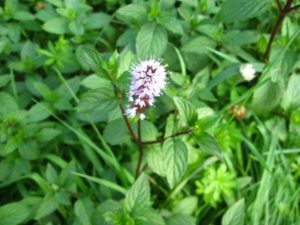
Peppermint.
Well-known peppermint – fragrant perennial up to 80 cm high – one of the most popular medicinal plants grown in our gardens. It is also widely used in cooking and cosmetology. Since ancient times, our ancestors planted peppermint near the windows and entrance doors to the house, in particular, due to the fact that this plant repels mosquitoes well. Peppermint, which grows on the loose fertile soils of the sunny corners of the garden, gives the strongest menthol aroma. But it can grow in the shade, however, it will smell weaker, and, accordingly, it will be weaker than mosquitoes.
4. Melissa officinalis (lemon mint)
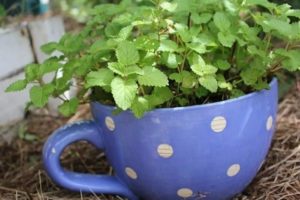
Melissa officinalis (lemon mint).
Outwardly, lemon balm is not very different from peppermint – it has a branched stem and grows in height a little higher. But its main difference is the smell. Melissa officinalis has a strong spicy aroma with light notes of lemon. But, like the menthol smell of peppermint, it perfectly repels mosquitoes. Melissa is perfect for the sunny places on your property. It can grow in partial shade.
5. Catnip catnip, or catnip

Catnip cat, or catnip.
One of the benefits of this peppermint is that it grows like a weed by itself. That is, it does not require any care. However, many gardeners consider catnip as a cat weed. But we must pay tribute to him: he copes with the task of repelling mosquitoes. If, for reliability, you decide to rub your skin with the leaves or flowers of this plant, be careful – all the cats in the area will pay special attention to you, because they simply adore catnip! The reason is the substance Nepalactone, which this plant is rich in. It is also the source of the lemon flavor characteristic of this variety of mint.
6. Monarda lemon
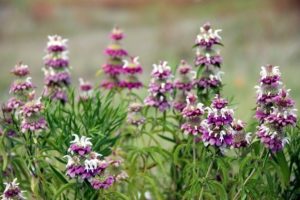
Monarda lemon.
Monarda lemon belongs to the same family as peppermint. But, unlike her, this is an annual plant. By the way, the only flyer in the monard family. Its leaves and flowers contain essential oils that repel insects, including mosquitoes. And the lemon monard can be easily attributed to the annual giants. After all, in just one season, it reaches 120 cm in height. He likes well-lit areas with loose fertile soil.
7. Mint, or Ombalo
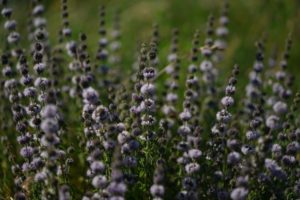
Swamp mint or ombalo
Mint, or Ombalo.
A perennial plant of the Mint genus, reaching a height of 20-40 cm. In appearance, it is easy to distinguish it from other types of mint by its compact size and creeping shape. It does not possess winter hardiness characteristic of most relatives, therefore, in central Russia, flea mint (another name for the plant) is grown as an annual. An invariable ingredient in Georgian tkemali sauce and a good natural insect repellent. Not only mosquitoes, but also flies, fleas and moths.
8. Sage
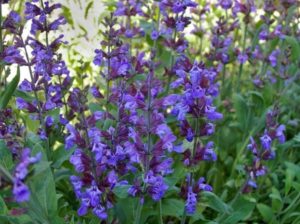
Salvia officinalis.
Hippocrates called this plant “sacred grass.” Its use in medicine today is so wide that it seems that there are far fewer diseases that it does not cure than those that cure. Hippocrates did not write anything about the properties of sage to repel mosquitoes (at least we don’t know about this), but in gardening it was noticed long ago that mosquitoes did not favor planting sage. More precisely – its tart aroma does not allow insects to determine the smell of a person who is next to a plant. Salvia officinalis is a perennial plant. In one place, it has been growing without transplant for 8 years. Loves soil of neutral acidity and good light.
9. Citronella Ceylon, or Lemon Grass
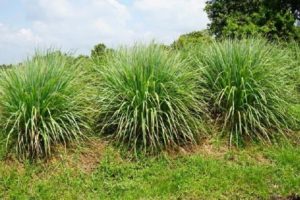
Citronella Ceylon, or lemon grass.
Very often, Ceylon citronella oils are used to create mosquito repellents. The plant has a very strong lemon smell, which also not only repels mosquitoes, but rather does not allow these insects to smell the smell of a person nearby. Lemon grass is a perennial cereal with a low level of winter hardiness. That is, in a temperate climate, it can only be grown as a tub culture, bringing the pot into a house or greenhouse along with the first significant cooling.
10. Sweet Basil, or Camphor Basil
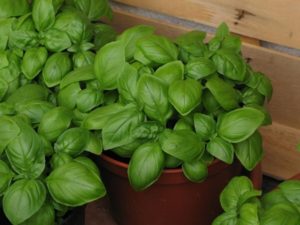
Sweet Basil, or Camphor Basil.
An annual herb that almost all the inhabitants of the earth know as a kitchen spice. But few people know that the essential oil of this plant has been used in medicine for many years. For example, it is part of the well-known “Broncholitin” (it is prescribed for coughing). The name itself, “camphor basil,” speaks of the substance rich in this herb. Camphor repels ants, moths and mosquitoes.
11. Lemon Verbena

Verbena lemon.
Evergreen shrub with a large crown. It is popularly considered a magical plant that can protect against evil eye and damage. But today, of course, it is used more in culinary, cosmetology and medicine than in rites of white magic. It has a pleasant smell with which mosquitoes do not want to be friends. It also scares off other insects – a dried twig of verbena is often put in a closet as a preventive measure against moths.
12. Marigolds
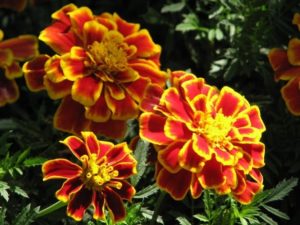
Marigold.
Bright and colorful marigolds are traditionally used on our flower beds. Very often they can be seen on the beds. Adherents of organic farming argue that these year-olds effectively protect cultivated plants from many harmful insects and other pests. Their smell is so rich and specific that it repels not only mosquitoes, but also some people who simply can not tolerate it. But in vain, because these are surprisingly decorative and unpretentious flowers.
13. Wormwood
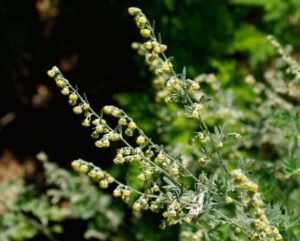
Wormwood.
Another grass with a very persistent specific odor that mosquitoes do not like. Wormwood is a perennial herbaceous plant of silver color, reaching up to 1.5 meters in height. One of the oldest medicinal plants known to mankind. It grows freely on forest edges, along roads, in neglected areas. Cultivated on an industrial scale for the sake of essential oil. In the garden, it is often found as a weed. However, many gardeners today, in order not to go after it into the forest, grow wormwood specially in their area. In addition to its medicinal properties, it protects cultural species from many pests and diseases.
14. Wormwood Pontic
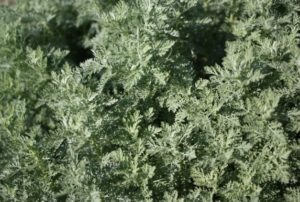 Wormwood Pontic.
Wormwood Pontic.
Unlike wormwood, this plant is very decorative. Therefore, it can often be found in gardens as an element of various landscape compositions. It is also commonly used in medicine and as a natural mosquito repellent.
15. Tansy
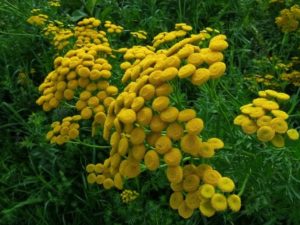
Tansy is ordinary.
Perennial herb of the forest and forest-steppe zone. It quickly clogs cultural meadows and pastures, therefore, tansy should be grown in the garden very carefully. This poisonous plant is often used in folk medicine for the treatment and prevention of various ailments. It has a characteristic pungent odor that repels mosquitoes.
So far, we have everything about plants – “mosquito repellents”. If you know others, write about them in the comments or on our Forum. We will be very grateful!
Top 15 ways to protect yourself from mosquito Octenol mosquito attractant
Top 15 ways to protect yourself from mosquito Octenol mosquito attractant
Top 15 ways to protect yourself from mosquito Octenol mosquito attractant

